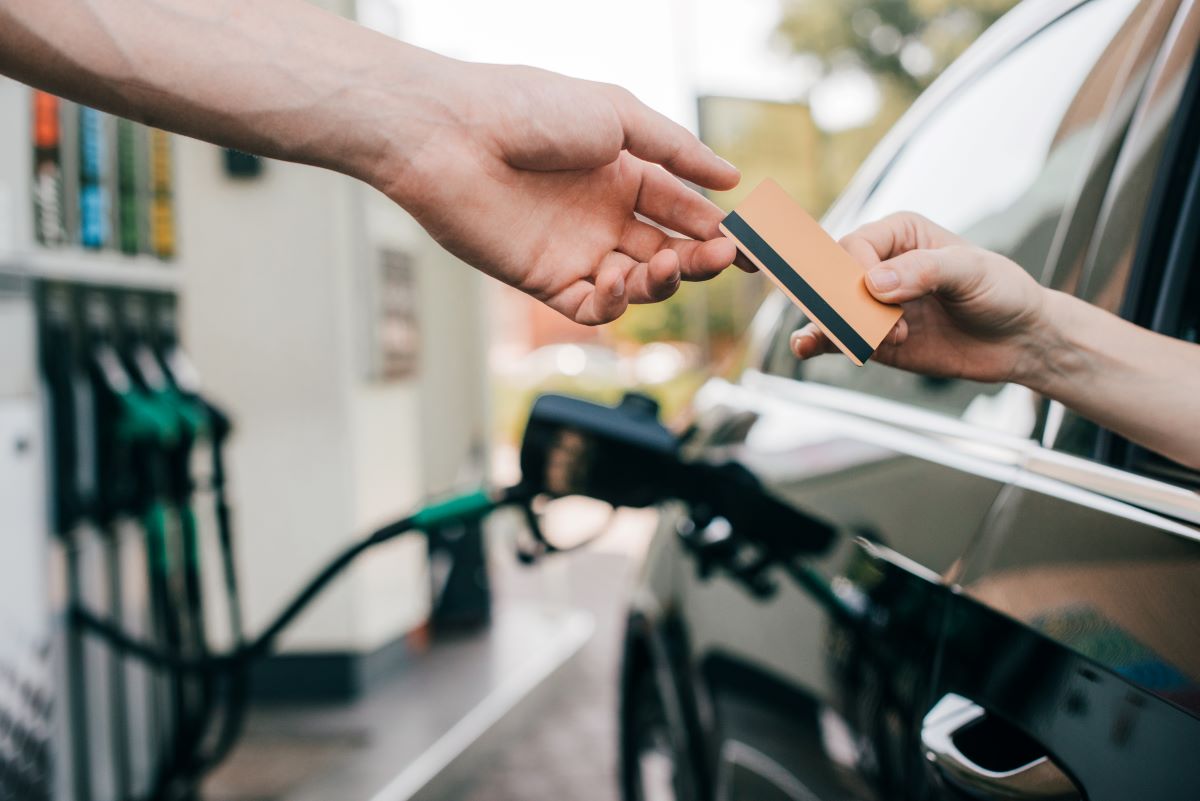Fuel cards for companies enable cashless payment of fuel. They are mainly used by companies in their fleets to simplify invoicing and accounting. However, the use of a fuel card for companies can also make sense in smaller fleets or even for individual vehicles, especially if many kilometers are driven and customer visits to distant locations are planned. What are the advantages and disadvantages of using a fuel card for employees and companies? And how does refueling work with it? We answer the most important questions about fuel cards for companies.
Contents
What are fuel cards for companies?
A fuel card is a cashless payment method for refueling vehicles. It is mainly used by companies to simplify the refueling process and keep fuel costs transparent. Alongside the use of fleet management software, they are a good way of making the tasks of fleet managers more efficient. Their use is particularly useful for frequent drivers who have to record and prove their fuel costs. Employers often provide fuel cards if employees are dependent on a car for business and the company covers the costs.
How does refueling with a fuel card work?
After the refueling process for cars, trucks and any other company vehicles, only the fuel card for companies is used for payment instead of cash, EC or credit cards. Fuel cards can often also be used as charging cards for electric vehicles. The filling station, such as Aral or Esso, then charges the amount directly to the account stored on the card. These functions can also be integrated into corporate car sharing vehicles and provide a transparent overview of all transactions.
What can be paid for with a fuel card?
Fuel cards for companies can be used to pay for vehicle-related products as well as fuel for combustion engines and electricity for electric vehicles. These include engine oil, antifreeze and windshield wiper blades. In some cases, it can also be used to pay for vehicle-related services such as car washes, inspections, maintenance or repairs. The exact acceptance points and benefits may vary depending on the provider, so it is advisable to check the specific terms and conditions of each company fuel card to know exactly what you can use it for.
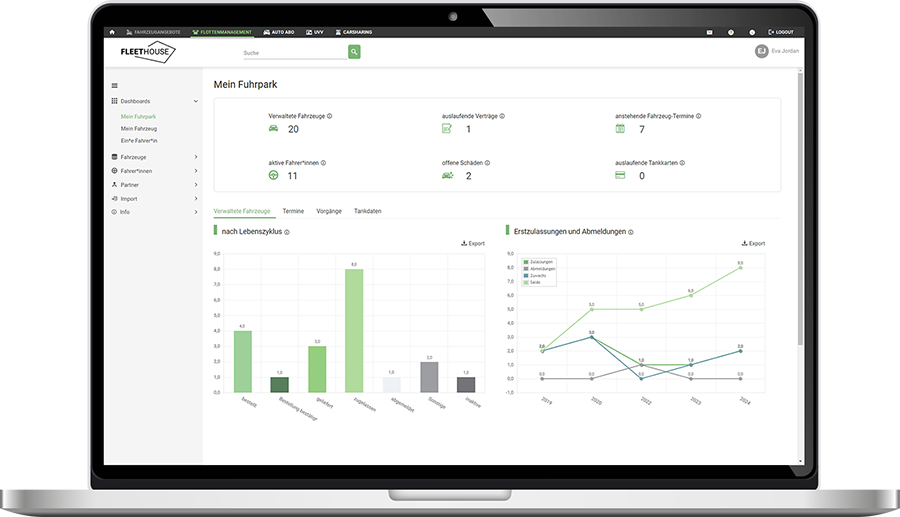
Fleet Management
Organize all tasks relating to your vehicles with Fleethouse.
Who offers fuel cards for companies and where can I fill up with them?
Fuel cards are offered by well-known petrol station companies such as Aral, Shell, Total and Esso. Energy suppliers and filling station operators such as Avia, Westfalen and Tamoil/HEM also offer them. In addition, there are service providers such as DKV or UTA that accept fuel cards for gasoline, electricity and other driver-related products or services. Many fuel card providers have corresponding apps that show all nearby petrol stations where you can pay with your fuel card. Suppliers who do not operate their own filling stations work together with various filling station networks. This also enables them to offer their own fuel cards for companies. Such cooperations also exist with large mineral oil companies. For example, Aral and Total accept each other’s fuel cards.
How expensive is a fuel card for companies?
The costs vary greatly and depend on the provider. There are providers who do not charge for the fuel card itself. This means that there is neither a set-up fee nor a monthly basic fee. There is also no minimum purchase quantity for the fuels. This means that no costs are incurred if the fuel card and the company car are not used. These fuel cards are particularly practical for irregular journeys with a company car.
Larger fleets may incur a monthly usage fee for each fuel card due to the higher administrative costs for the provider. However, considerable savings can be made through discounts on fuel or electricity.
Does this make refueling cheaper?
By using fuel cards, users can save money in various places. Depending on the provider, you can benefit from volume discounts on the purchase of gasoline and electricity, and there are also discounts on motor oil or car washes. Additional discounts can be negotiated, especially for large fleets that consume a considerable amount of gasoline, electricity, engine oil and car washes. However, costs can be saved not only here, but also on the administrative side, as the fuel card for employees also reduces working time, both on the driver’s side and on the vehicle management side.
Advantages and disadvantages of a fuel card
Companies should consider using fuel cards, as their use is often worthwhile. When using fuel cards for companies, the administrative workload in the fleet can be reduced. The fuel card also enables cashless payment of fuel invoices and subsequent electronic processing. However, there can also be risks associated with its use.
Advantages of a fuel card for companies
- Individual adaptation to the driver
- Cost control in terms of fuel type, budget limit, type of goods and services, etc.
- Security through PIN and limitation (per day, week or month)
- Graduated discounts possible depending on consumption
- Convenient further processing of data for accounting and the HR department
Disadvantages of a fuel card for companies
- Fuel cards can often only be used at certain filling stations
- There is a risk of misuse of the card
- The obligation to make a minimum purchase (with some fuel card providers)
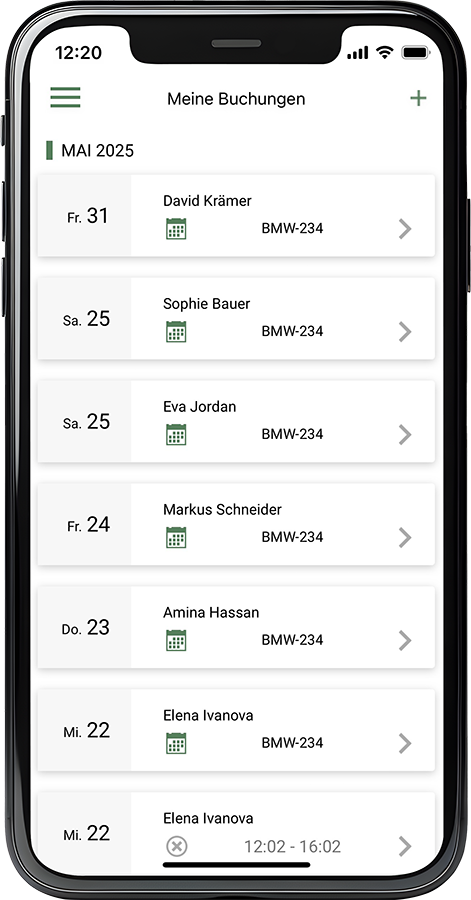
Would you like to make your fleet more efficient?
Register with Fleethouse and manage your fleet completely digitally.
Everything at a glance with the fuel card for companies
A fuel card offers a clear advantage in terms of accounting: employees no longer have to laboriously submit receipts and advance costs. Instead, they can conveniently view which transactions they have made online via the corresponding portal. Depending on the provider, this information is presented in different ways. These data and statements generally enable an evaluation of the total fuel consumption and kilometers driven, which can then be forwarded to the tax office for the tax return. This makes accounting tasks even easier. Together with fleet management software, this gives you a good overview of your fleet.
Keep an overview of fuel card consumption
By using a company fuel card, it is possible to impose certain restrictions and authorizations on employees. This is particularly important for pool vehicles. Special care must be taken when paying for additional services via the fuel card: It may not be necessary to grant all drivers access to all additional services. In addition to time and regional restrictions, it often makes sense to set a fuel limit, either in liters or in cost.
Commercial fuel cards are also worthwhile
Small businesses also benefit from a fuel card for companies. The use of a commercial fuel card can be worthwhile for just one vehicle. As a rule, there are no fees or minimum purchase quantities for companies. Instead, customers receive discounts from the very first liter of fuel with the commercial fuel card.
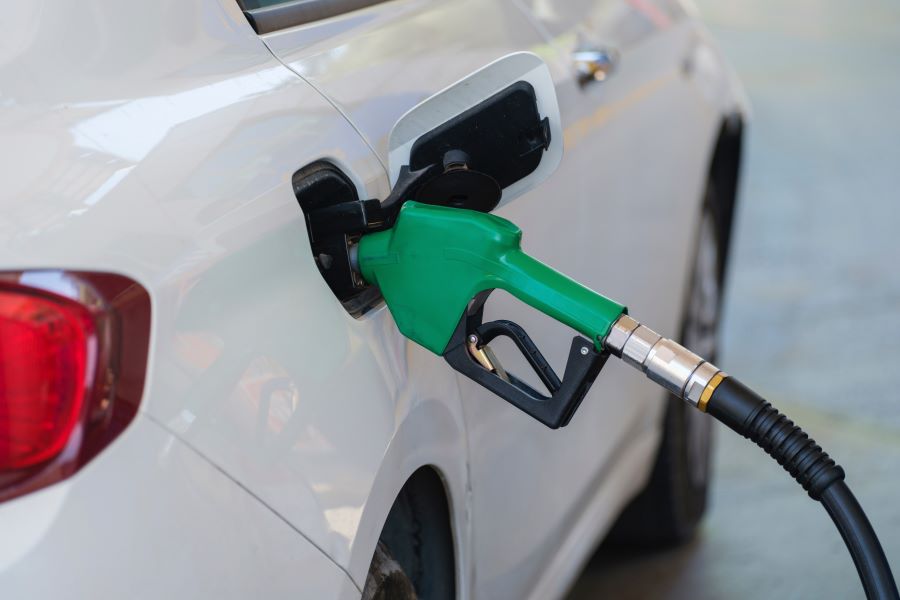
Fuel card as an advantage for larger companies
Larger companies also benefit from the use of fuel cards for companies. Reasons for this include the fact that the purchase of fuels and lubricants can be processed completely cashless using company fuel cards, which simplifies payment processing and eliminates the risk of cash losses. In addition, company fuel cards allow individual agreements to be made on the scope of services, so that companies can receive customized solutions. In addition, the use of company fuel cards opens up the possibility of cashless purchases of goods or vehicle accessories, which simplifies the procurement process and offers additional convenience.
Furthermore, tunnel and bridge tolls can be conveniently billed with the commercial fuel card, which offers companies a further administrative simplification. Ferry charges can also be billed via the fuel card, which is particularly relevant for companies that regularly use ferry connections. In addition to these services, a fuel card offers special roadside assistance to provide fast and efficient support in the event of vehicle breakdowns.
It is possible to bill highway tolls via the fuel card, which saves a lot of time and effort in manual billing. Company fuel cards also make it easy to settle toll charges, which is particularly advantageous when driving through toll road sections or countries.
The fuel card is characterized by its flexible and secure use, as there is no risk of losing cash, for example, and the card can be used for various business purposes. Together with fleet software, fuel cards can considerably simplify the management of costs in the fleet and thus relieve the burden on fleet managers.
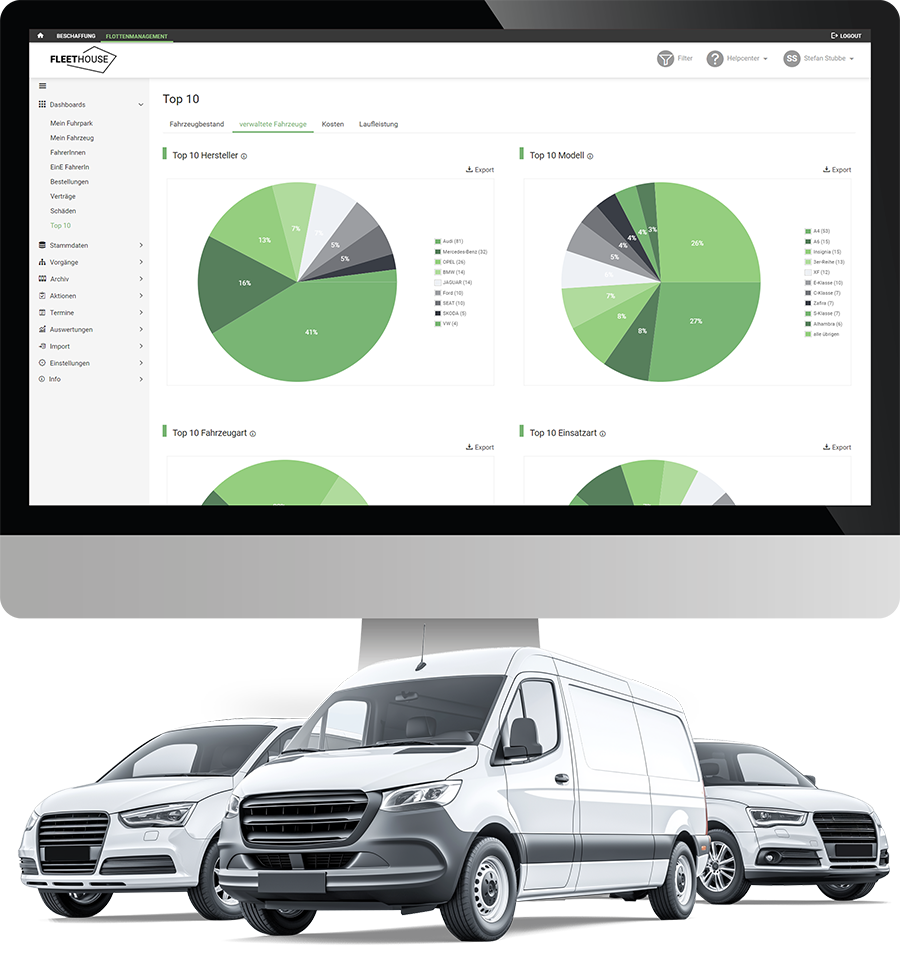
Do you keep an eye on your fleet?
Find out how you can manage your fleet efficiently with Fleethouse.
FAQ - Fuel cards for companies
The price of a fuel card for companies can vary greatly depending on the provider, service package and usage. Generally, providers charge monthly basic fees per card, which can range from 1 to 10 euros. Transaction fees or surcharges are often added to the fuel price. Individual negotiations are often possible, especially for larger fleets, which can significantly reduce the actual cost of a fuel card for companies.
The best fuel card for companies depends on the individual requirements of the company. Important criteria include the petrol station network covered by the card, discounts and conditions on fuel prices, additional services such as toll billing or vehicle service as well as acceptance at home and abroad.
A fuel card is particularly worthwhile for companies and the self-employed who want to refuel regularly and manage their expenses better. Companies with their own fleet of vehicles, sales representatives or craft businesses in particular benefit from the advantages.
The most important facts about fuel cards for companies
For small and medium-sized companies, fuel cards for companies are recommended, as a fuel card for businesses simplifies the handling of fuel costs.
The fuel card eliminates a lot of administrative work with regard to billing and receipts.
The fuel card invoices issued provide an optimal basis for tax calculations and tax refunds for fuel VAT.
Further Fleet Knowledge
If you liked this article and would like to know more about this topic, we recommend these articles.

Fleet Manager: Tasks, Qualifications and Salary

Corporate car sharing: advantages and tips for your company



